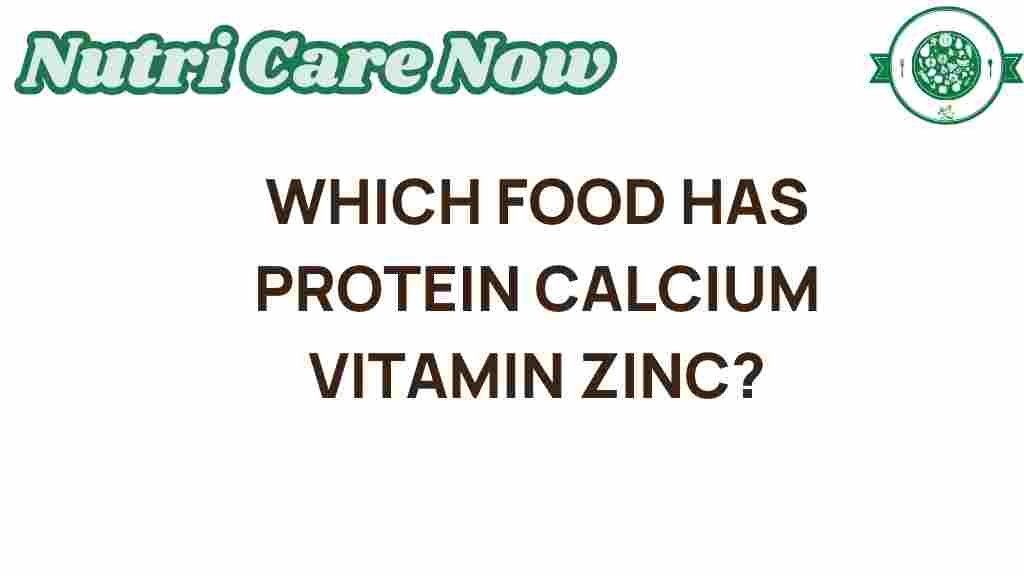Discover Which Foods Are Packed with Protein, Calcium, Vitamin, and Zinc
Nutrition plays a vital role in maintaining our overall health and well-being. Understanding the dietary sources of essential nutrients like protein, calcium, vitamins, and zinc can empower individuals to make informed food choices. In this article, we will explore the best foods rich in these essential nutrients, their health benefits, and how to incorporate them into your diet effectively.
1. Understanding Essential Nutrients
Essential nutrients are compounds that our bodies cannot produce on their own, yet they are crucial for various bodily functions. Here’s a quick overview of the nutrients we will focus on:
- Protein: Vital for building and repairing tissues, enzymes, and hormones.
- Calcium: Important for healthy bones and teeth, muscle function, and nerve signaling.
- Vitamins: Organic compounds that are crucial for metabolism, immunity, and overall health.
- Zinc: Essential for immune function, protein synthesis, and DNA synthesis.
2. Foods Rich in Protein
Protein is a fundamental component of every cell in our body. It is essential for growth, maintenance, and repair. Here are some top dietary sources of protein:
- Meat: Chicken, turkey, beef, and pork are excellent sources of high-quality protein.
- Fish: Salmon, tuna, and sardines provide not only protein but also healthy omega-3 fatty acids.
- Dairy Products: Milk, yogurt, and cheese are rich in protein and calcium.
- Legumes: Lentils, chickpeas, and beans are great plant-based protein sources.
- Nuts and Seeds: Almonds, peanuts, chia seeds, and flaxseeds offer protein along with healthy fats.
3. Foods High in Calcium
Calcium is crucial for maintaining strong bones and teeth. It also plays a role in muscle contraction and nerve function. Here are some dietary sources of calcium:
- Dairy Products: Milk, cheese, and yogurt are the most well-known sources of calcium.
- Leafy Greens: Kale, collard greens, and broccoli provide plant-based calcium.
- Fortified Foods: Some cereals and plant-based milk are fortified with calcium.
- Fish with Bones: Sardines and canned salmon are also rich in calcium.
4. Foods Packed with Vitamins
Vitamins are essential for various bodily functions, including immune response and energy production. Different vitamins have distinct food sources:
- Vitamin A: Found in carrots, sweet potatoes, and dark leafy greens.
- Vitamin C: Citrus fruits, strawberries, and bell peppers are great sources.
- Vitamin D: Fatty fish, egg yolks, and fortified foods provide vitamin D.
- Vitamin E: Nuts, seeds, and spinach are rich in this important vitamin.
5. Foods Rich in Zinc
Zinc plays a critical role in immune function and is involved in over 300 enzymatic reactions in the body. Here are some excellent dietary sources of zinc:
- Meat: Beef, pork, and lamb are particularly high in zinc.
- Shellfish: Oysters are one of the best sources of zinc.
- Legumes: Beans and lentils also provide a good amount of zinc.
- Nuts and Seeds: Pumpkin seeds and cashews are great plant sources of zinc.
6. Combining Foods for Optimal Nutrition
To maximize the health benefits of these essential nutrients, consider combining different food sources in your meals. Here are some ideas:
- Breakfast: Greek yogurt topped with nuts and fresh fruit for protein, calcium, and vitamins.
- Lunch: A spinach salad with grilled chicken, chickpeas, and a sprinkle of pumpkin seeds for protein, zinc, and vitamins.
- Dinner: Baked salmon with steamed broccoli and quinoa for protein, calcium, and a variety of vitamins.
7. Troubleshooting Nutritional Deficiencies
If you are concerned about not getting enough protein, calcium, vitamins, or zinc in your diet, consider these tips:
- Evaluate Your Diet: Keep a food diary to track your nutrient intake.
- Consult a Healthcare Professional: A registered dietitian can help you create a balanced meal plan.
- Consider Supplements: If necessary, you may want to consider supplements, but always consult a healthcare provider first.
8. The Benefits of a Nutrient-Rich Diet
Incorporating foods high in protein, calcium, vitamins, and zinc into your diet can lead to numerous health benefits, including:
- Improved Immune Function: Adequate zinc and vitamins support a healthy immune system.
- Stronger Bones: Calcium and vitamin D are essential for bone health.
- Enhanced Muscle Growth: Protein is vital for muscle repair and growth, especially for athletes.
- Better Skin Health: Vitamins A and E contribute to healthy skin and may reduce signs of aging.
9. Conclusion
Understanding which foods are packed with protein, calcium, vitamins, and zinc is essential for maintaining good health. By focusing on these dietary sources, you can ensure that you are getting the essential nutrients your body needs. Remember, a balanced diet not only supports physical health but also enhances overall well-being.
For more information on nutrition and dietary sources, visit the Nutrition Resource Center. Start making informed food choices today and enjoy the benefits of a nutrient-rich diet!
With the right knowledge, you can easily incorporate these essential nutrients into your meals, ensuring a healthier lifestyle. Empower yourself with nutrition knowledge and make choices that support your health.
This article is in the category Diet and created by NutriCareNow Team
